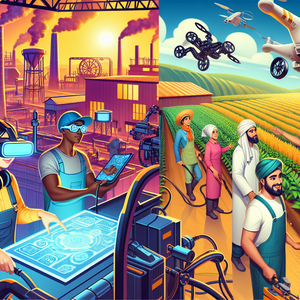Nvidia's Role in AI: From Gaming to Global Impact

Nvidia's GPUs have become synonymous with high-performance computing, not just for rendering stunning graphics but also for executing complex calculations at unprecedented speeds. The parallel processing capabilities of these GPUs make them ideal for AI and machine learning tasks, where vast amounts of data need to be processed simultaneously. Deep learning, a subset of AI, relies heavily on neural networks that require substantial computational power to train. Nvidia's CUDA (Compute Unified Device Architecture) platform allows researchers and developers to harness the power of GPUs for tasks such as image recognition and natural language processing. This has enabled significant advancements in AI research and application, as seen in projects like OpenAI's GPT language models, which utilize Nvidia's technology to train on massive datasets efficiently. For example, the training of large language models can be accelerated through the use of Nvidia's GPUs, allowing researchers to iterate faster and improve model performance.
Transforming Healthcare with AI
One of the most impactful applications of Nvidia's technology is in the healthcare sector. The company has partnered with healthcare providers and research institutions to develop AI solutions that enhance diagnostics, treatment planning, and patient care. Nvidia's Clara platform provides tools for AI-powered medical imaging, enabling radiologists to analyze scans with greater accuracy and speed. AI algorithms can detect anomalies in medical images that may be missed by the human eye, leading to earlier and more accurate diagnoses. For instance, studies have shown that AI models trained on Nvidia's platforms have outperformed human radiologists in detecting certain types of cancers in medical imaging. Furthermore, Nvidia's GPUs are used in genomics research, enabling scientists to process and analyze genetic data, which can lead to personalized medicine and targeted therapies.
Financial Sector Innovations
In finance, Nvidia's contributions extend to algorithmic trading, risk management, and fraud detection. Financial institutions are increasingly turning to AI to analyze market trends, predict stock movements, and assess risk factors. Nvidia's technology allows these institutions to process large datasets in real-time, facilitating faster decision-making and improving overall efficiency. For instance, banks utilize Nvidia's GPUs to run complex simulations and predictive models that help assess the risk of various investment strategies. One notable example is the use of AI-driven trading algorithms that can analyze historical data and execute trades in microseconds, capitalizing on fleeting market opportunities. Additionally, AI-driven fraud detection systems powered by Nvidia's technology can analyze transaction patterns to identify potentially fraudulent activities, safeguarding both customers and financial institutions.
Autonomous Vehicles: Driving the Future
Nvidia's impact on AI is also evident in the autonomous vehicle industry. The company has developed the Drive platform, which offers a comprehensive suite of hardware and software solutions for self-driving cars. Nvidia's GPUs enable real-time processing of data from various sensors, such as cameras, LIDAR, and radar, allowing vehicles to make split-second decisions in complex driving environments. Companies like Tesla and other automotive manufacturers have incorporated Nvidia's technology to enhance their autonomous driving capabilities. For example, Tesla's Full Self-Driving (FSD) system leverages Nvidia's AI capabilities to interpret real-time data from its vehicles, enabling features like lane changes and traffic navigation without human intervention. This has accelerated the development of safer and more reliable self-driving vehicles, paving the way for a future where cars can navigate without human oversight.
Nvidia's journey from a gaming-focused company to a key player in the AI revolution highlights the transformative power of technology. By leveraging its advanced GPU technology, Nvidia has not only reshaped the gaming industry but has also propelled innovation across various sectors, including healthcare, finance, and autonomous vehicles. As AI continues to evolve, Nvidia's role in driving these advancements will likely expand, further cementing its position as a leader in technology that impacts our world on multiple fronts. The implications of Nvidia's contributions to AI are profound, offering a glimpse into a future where technology enhances human capabilities and transforms industries for the better. As we look forward, the synergy between Nvidia's technology and AI will play a crucial role in shaping a smarter, more efficient, and more connected world.
AI Research Scientist
Nvidia, Google AI, OpenAI
Core Responsibilities
Develop and implement machine learning algorithms to solve complex problems in various domains, such as healthcare or finance.
Conduct experiments to evaluate the performance of AI models and iterate on designs based on findings.
Required Skills
Strong background in mathematics, statistics, and computer science.
Proficiency in programming languages such as Python and frameworks like TensorFlow or PyTorch.
Deep Learning Engineer
Tesla, Facebook AI Research, Amazon Web Services
Core Responsibilities
Design and optimize deep learning models for applications such as image and speech recognition.
Collaborate with data scientists and software engineers to integrate AI solutions into existing systems.
Required Skills
Expertise in neural network architectures and experience with GPU programming.
Familiarity with programming tools like CUDA and libraries for deep learning.
Data Scientist in Healthcare
Hospitals, Philips, Siemens
Core Responsibilities
Analyze large datasets to uncover insights that drive improvements in patient care and treatment outcomes.
Develop predictive models to enhance diagnostic accuracy using AI tools and medical imaging technologies.
Required Skills
Experience with statistical analysis and machine learning techniques tailored for healthcare applications.
Knowledge of medical terminologies and familiarity with healthcare data regulations (e.g., HIPAA).
Autonomous Vehicle Software Engineer
Nvidia, Tesla, Waymo
Core Responsibilities
Develop software algorithms for real-time data processing from sensors, enabling safe navigation and decision-making for autonomous vehicles.
Collaborate in cross-functional teams to test and validate self-driving technology in simulated and real-world environments.
Required Skills
Strong programming skills in C++ and Python, with experience in robotics or automotive systems.
Understanding of computer vision, sensor fusion, and machine learning techniques specific to autonomous driving.
AI Product Manager
Google, Microsoft
Core Responsibilities
Drive the development and market strategy for AI-powered products, ensuring alignment with customer needs and technological capabilities.
Collaborate with engineering and design teams to create software solutions that leverage AI technologies, such as Nvidia’s GPUs.
Required Skills
Strong understanding of AI technologies and their applications in various industries.
Excellent communication and project management skills, with experience in agile methodologies.


